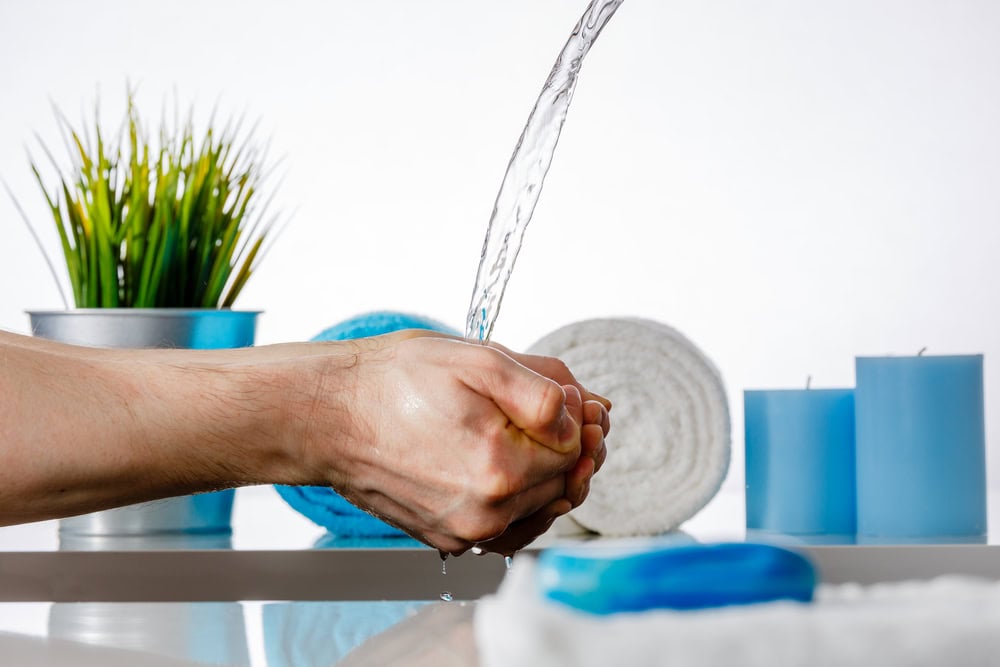How Should I Understand Conflicting Hadith About the Purity of Used Water?
Shafi'i Fiqh
Answered by Shaykh Irshaad Sedick
Question
There is a hadith that the Prophet (Allah bless him and give him peace) forbade women from washing with water left over by men, and vice versa. However, another hadith mentions the Prophet (Allah bless him and give him peace) performed a bath with water left over by ‘Aisha (Allah be pleased with her). This creates doubt about whether it is permissible, leading to various interpretations. How should I resolve this?
Answer
In the Name of Allah, the Most Merciful and Compassionate. May Allah alleviate our difficulties and guide us to what pleases Him. Amin.
When a body of water is less than 200 litres (qullatayn) and is used for obligatory purification, such water is considered pure water that can no longer purify (cannot be used again for ghusl, ablution, etc.), unless it has been collected and amounts to more than 200 litres.
Suppose one uses a body of water over 200 litres (qullatayn) for obligatory purification. Such water will not be considered used water but will remain pure and purifying (can be used for ghusl, ablution, etc.) [Nawawi, Minhaj al-Talibin]
Synthesizing Apparently Conflicting Evidence
There are numerous Prophetic narrations of various authenticity strengths and clarity, which directly or indirectly play a role in determining the rulings on water’s purity and purificatory ability.
Synthesizing these bytes of evidence is a complex process requiring profound knowledge and expertise. This process is, therefore, the sole domain of the Scholars and one of the main reasons for the development of the traditional Schools of Law (Madhahib). The four Schools of Sunni Islam differ in their interpretations of the Prophetic narrations in question.
The Shafi‘i School would generally interpret the prohibition of different people using the same water for purificatory purposes as applicable when the total body of water amounts to less than 200 litres, while the evidence suggesting permissibility for this refers to a body of water amounting to more than 200 litres, and Allah knows best. [Nawawi, al-Majmu‘ Sharh al-Muhadhdhab]
Bathing in the Same Water
As for 200 litres (qullatayn) or more of water, even if two or more persons in a state of major ritual impurity (janaba) are immersed in it, whether simultaneously or serially, their impurity is lifted, and the water does not thereby become used (but remains purifying). [Keller, Reliance of the Traveller]
Qullatayn (lit. “two great jars”) roughly equal five hundred Baghdad ritls, and their volume is one and a quarter dhira‘ in height, width, and length.
Note that contemporary Shafi‘i Scholars differ about the exact quantity of qullatayn. Shaykh Nuh Ha Mim Keller estimates it as 216 litres, while others, such as Mufti Taha Karaan, estimates it as 200 litres, and Allah knows best.
I pray this is of benefit and that Allah guides us all.
[Shaykh] Irshaad Sedick
Checked and Approved by Shaykh Faraz Rabbani
Shaykh Irshaad Sedick was raised in South Africa in a traditional Muslim family. He graduated from Dar al-Ulum al-Arabiyyah al-Islamiyyah in Strand, Western Cape, under the guidance of the late world-renowned scholar Shaykh Taha Karaan (Allah have mercy on him), where he taught.
Shaykh Irshaad received Ijaza from many luminaries of the Islamic world, including Shaykh Taha Karaan, Shaykh Muhammad Awama, Shaykh Muhammad Hasan Hitu, and Mawlana Abdul Hafeez Makki, among others.
He is the author of the text “The Musnad of Ahmad ibn Hanbal: A Hujjah or not?” He has been the Director of the Discover Islam Centre, and for six years, he has been the Khatib of Masjid Ar-Rashideen, Mowbray, Cape Town.
Shaykh Irshaad has fifteen years of teaching experience at some of the leading Islamic institutes in Cape Town). He is currently building an Islamic podcast, education, and media platform called ‘Isnad Academy’ and has completed his Master’s degree in the study of Islam at the University of Johannesburg. He has a keen interest in healthy Prophetic living and fitness.
